Organizational Behaviour at Coca-Cola: Impact and Analysis Report
VerifiedAdded on 2023/01/12
|13
|5512
|40
Report
AI Summary
This report provides a comprehensive analysis of organizational behavior within Coca-Cola, examining the influence of culture, politics, and power on individual and team performance. It delves into Handy's model of organizational culture, exploring power, role, task, and person cultures, and their impact on employee motivation and behavior. The report further evaluates content and process theories of motivation, including Maslow's Hierarchy of Needs, and assesses their application in achieving organizational goals. It compares effective and ineffective teams, analyzing team development theories and applying organizational behavior concepts within a business context. The report offers critical evaluations and recommendations, providing insights into how Coca-Cola can optimize its organizational strategies to enhance team success and overall performance. The report concludes with an analysis of the relationship between culture, politics, power, and motivation within the organization.
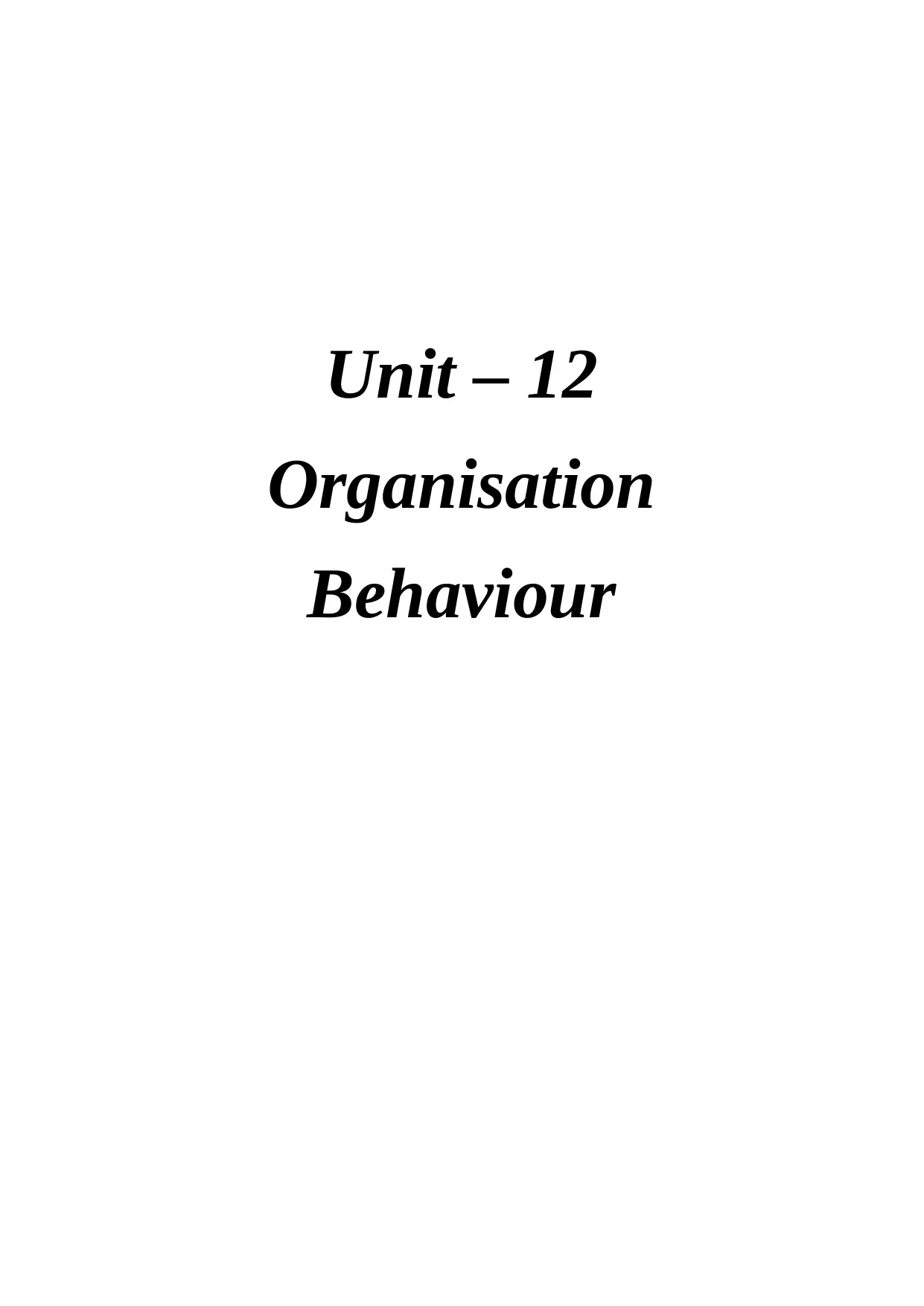
Unit – 12
Organisation
Behaviour
Organisation
Behaviour
Paraphrase This Document
Need a fresh take? Get an instant paraphrase of this document with our AI Paraphraser
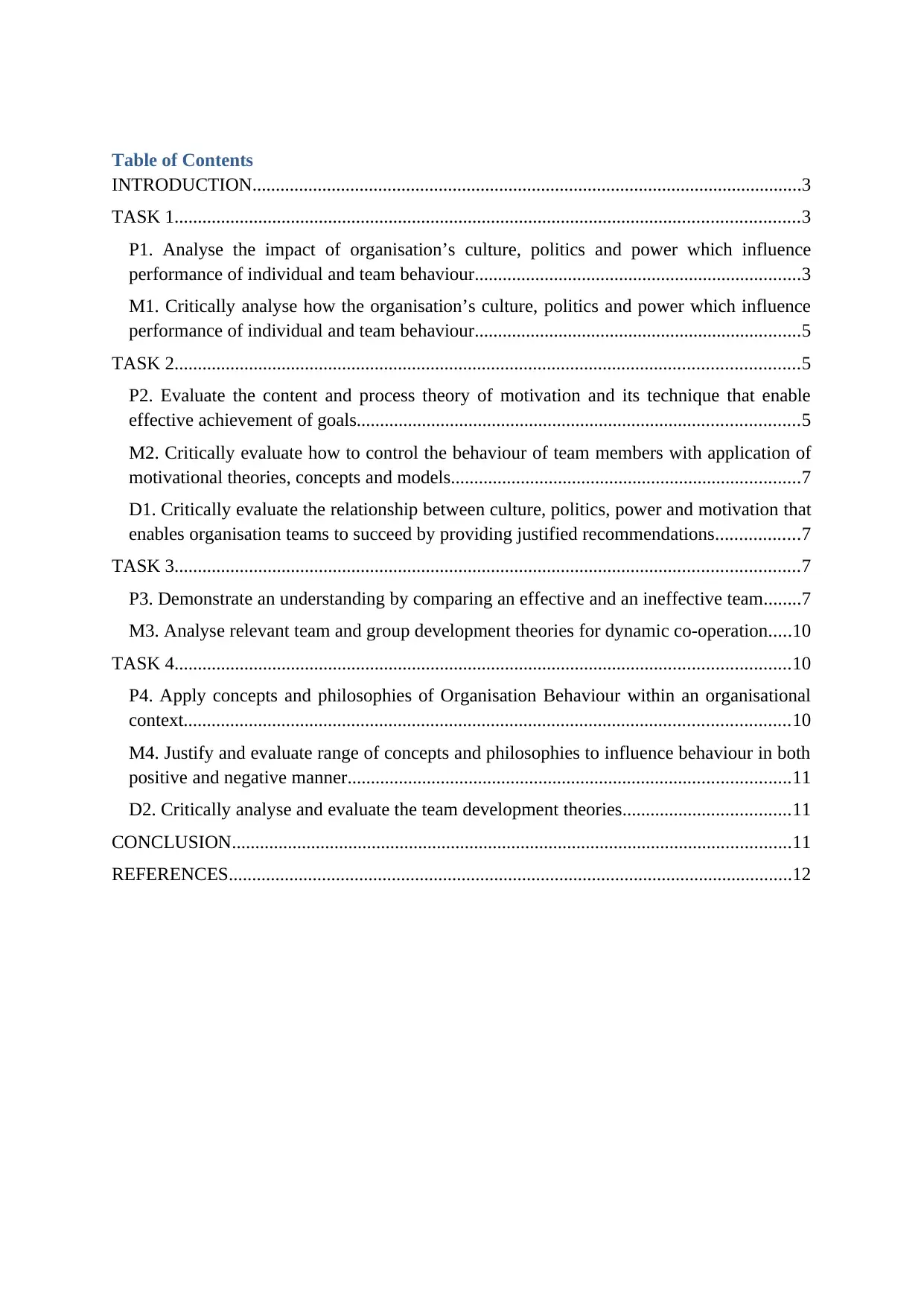
Table of Contents
INTRODUCTION......................................................................................................................3
TASK 1......................................................................................................................................3
P1. Analyse the impact of organisation’s culture, politics and power which influence
performance of individual and team behaviour......................................................................3
M1. Critically analyse how the organisation’s culture, politics and power which influence
performance of individual and team behaviour......................................................................5
TASK 2......................................................................................................................................5
P2. Evaluate the content and process theory of motivation and its technique that enable
effective achievement of goals...............................................................................................5
M2. Critically evaluate how to control the behaviour of team members with application of
motivational theories, concepts and models...........................................................................7
D1. Critically evaluate the relationship between culture, politics, power and motivation that
enables organisation teams to succeed by providing justified recommendations..................7
TASK 3......................................................................................................................................7
P3. Demonstrate an understanding by comparing an effective and an ineffective team........7
M3. Analyse relevant team and group development theories for dynamic co-operation.....10
TASK 4....................................................................................................................................10
P4. Apply concepts and philosophies of Organisation Behaviour within an organisational
context..................................................................................................................................10
M4. Justify and evaluate range of concepts and philosophies to influence behaviour in both
positive and negative manner...............................................................................................11
D2. Critically analyse and evaluate the team development theories....................................11
CONCLUSION........................................................................................................................11
REFERENCES.........................................................................................................................12
INTRODUCTION......................................................................................................................3
TASK 1......................................................................................................................................3
P1. Analyse the impact of organisation’s culture, politics and power which influence
performance of individual and team behaviour......................................................................3
M1. Critically analyse how the organisation’s culture, politics and power which influence
performance of individual and team behaviour......................................................................5
TASK 2......................................................................................................................................5
P2. Evaluate the content and process theory of motivation and its technique that enable
effective achievement of goals...............................................................................................5
M2. Critically evaluate how to control the behaviour of team members with application of
motivational theories, concepts and models...........................................................................7
D1. Critically evaluate the relationship between culture, politics, power and motivation that
enables organisation teams to succeed by providing justified recommendations..................7
TASK 3......................................................................................................................................7
P3. Demonstrate an understanding by comparing an effective and an ineffective team........7
M3. Analyse relevant team and group development theories for dynamic co-operation.....10
TASK 4....................................................................................................................................10
P4. Apply concepts and philosophies of Organisation Behaviour within an organisational
context..................................................................................................................................10
M4. Justify and evaluate range of concepts and philosophies to influence behaviour in both
positive and negative manner...............................................................................................11
D2. Critically analyse and evaluate the team development theories....................................11
CONCLUSION........................................................................................................................11
REFERENCES.........................................................................................................................12
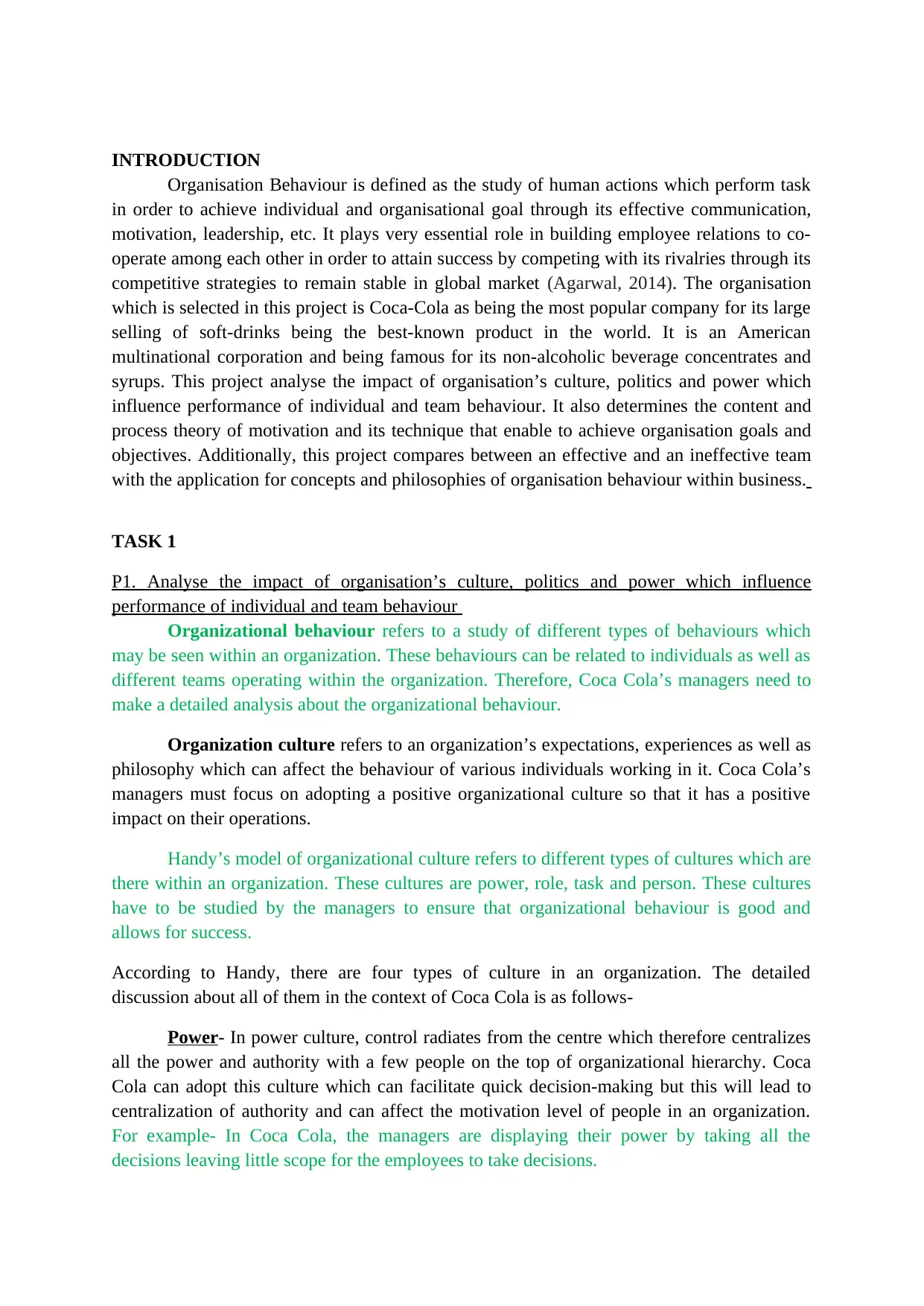
INTRODUCTION
Organisation Behaviour is defined as the study of human actions which perform task
in order to achieve individual and organisational goal through its effective communication,
motivation, leadership, etc. It plays very essential role in building employee relations to co-
operate among each other in order to attain success by competing with its rivalries through its
competitive strategies to remain stable in global market (Agarwal, 2014). The organisation
which is selected in this project is Coca-Cola as being the most popular company for its large
selling of soft-drinks being the best-known product in the world. It is an American
multinational corporation and being famous for its non-alcoholic beverage concentrates and
syrups. This project analyse the impact of organisation’s culture, politics and power which
influence performance of individual and team behaviour. It also determines the content and
process theory of motivation and its technique that enable to achieve organisation goals and
objectives. Additionally, this project compares between an effective and an ineffective team
with the application for concepts and philosophies of organisation behaviour within business.
TASK 1
P1. Analyse the impact of organisation’s culture, politics and power which influence
performance of individual and team behaviour
Organizational behaviour refers to a study of different types of behaviours which
may be seen within an organization. These behaviours can be related to individuals as well as
different teams operating within the organization. Therefore, Coca Cola’s managers need to
make a detailed analysis about the organizational behaviour.
Organization culture refers to an organization’s expectations, experiences as well as
philosophy which can affect the behaviour of various individuals working in it. Coca Cola’s
managers must focus on adopting a positive organizational culture so that it has a positive
impact on their operations.
Handy’s model of organizational culture refers to different types of cultures which are
there within an organization. These cultures are power, role, task and person. These cultures
have to be studied by the managers to ensure that organizational behaviour is good and
allows for success.
According to Handy, there are four types of culture in an organization. The detailed
discussion about all of them in the context of Coca Cola is as follows-
Power- In power culture, control radiates from the centre which therefore centralizes
all the power and authority with a few people on the top of organizational hierarchy. Coca
Cola can adopt this culture which can facilitate quick decision-making but this will lead to
centralization of authority and can affect the motivation level of people in an organization.
For example- In Coca Cola, the managers are displaying their power by taking all the
decisions leaving little scope for the employees to take decisions.
Organisation Behaviour is defined as the study of human actions which perform task
in order to achieve individual and organisational goal through its effective communication,
motivation, leadership, etc. It plays very essential role in building employee relations to co-
operate among each other in order to attain success by competing with its rivalries through its
competitive strategies to remain stable in global market (Agarwal, 2014). The organisation
which is selected in this project is Coca-Cola as being the most popular company for its large
selling of soft-drinks being the best-known product in the world. It is an American
multinational corporation and being famous for its non-alcoholic beverage concentrates and
syrups. This project analyse the impact of organisation’s culture, politics and power which
influence performance of individual and team behaviour. It also determines the content and
process theory of motivation and its technique that enable to achieve organisation goals and
objectives. Additionally, this project compares between an effective and an ineffective team
with the application for concepts and philosophies of organisation behaviour within business.
TASK 1
P1. Analyse the impact of organisation’s culture, politics and power which influence
performance of individual and team behaviour
Organizational behaviour refers to a study of different types of behaviours which
may be seen within an organization. These behaviours can be related to individuals as well as
different teams operating within the organization. Therefore, Coca Cola’s managers need to
make a detailed analysis about the organizational behaviour.
Organization culture refers to an organization’s expectations, experiences as well as
philosophy which can affect the behaviour of various individuals working in it. Coca Cola’s
managers must focus on adopting a positive organizational culture so that it has a positive
impact on their operations.
Handy’s model of organizational culture refers to different types of cultures which are
there within an organization. These cultures are power, role, task and person. These cultures
have to be studied by the managers to ensure that organizational behaviour is good and
allows for success.
According to Handy, there are four types of culture in an organization. The detailed
discussion about all of them in the context of Coca Cola is as follows-
Power- In power culture, control radiates from the centre which therefore centralizes
all the power and authority with a few people on the top of organizational hierarchy. Coca
Cola can adopt this culture which can facilitate quick decision-making but this will lead to
centralization of authority and can affect the motivation level of people in an organization.
For example- In Coca Cola, the managers are displaying their power by taking all the
decisions leaving little scope for the employees to take decisions.
⊘ This is a preview!⊘
Do you want full access?
Subscribe today to unlock all pages.

Trusted by 1+ million students worldwide
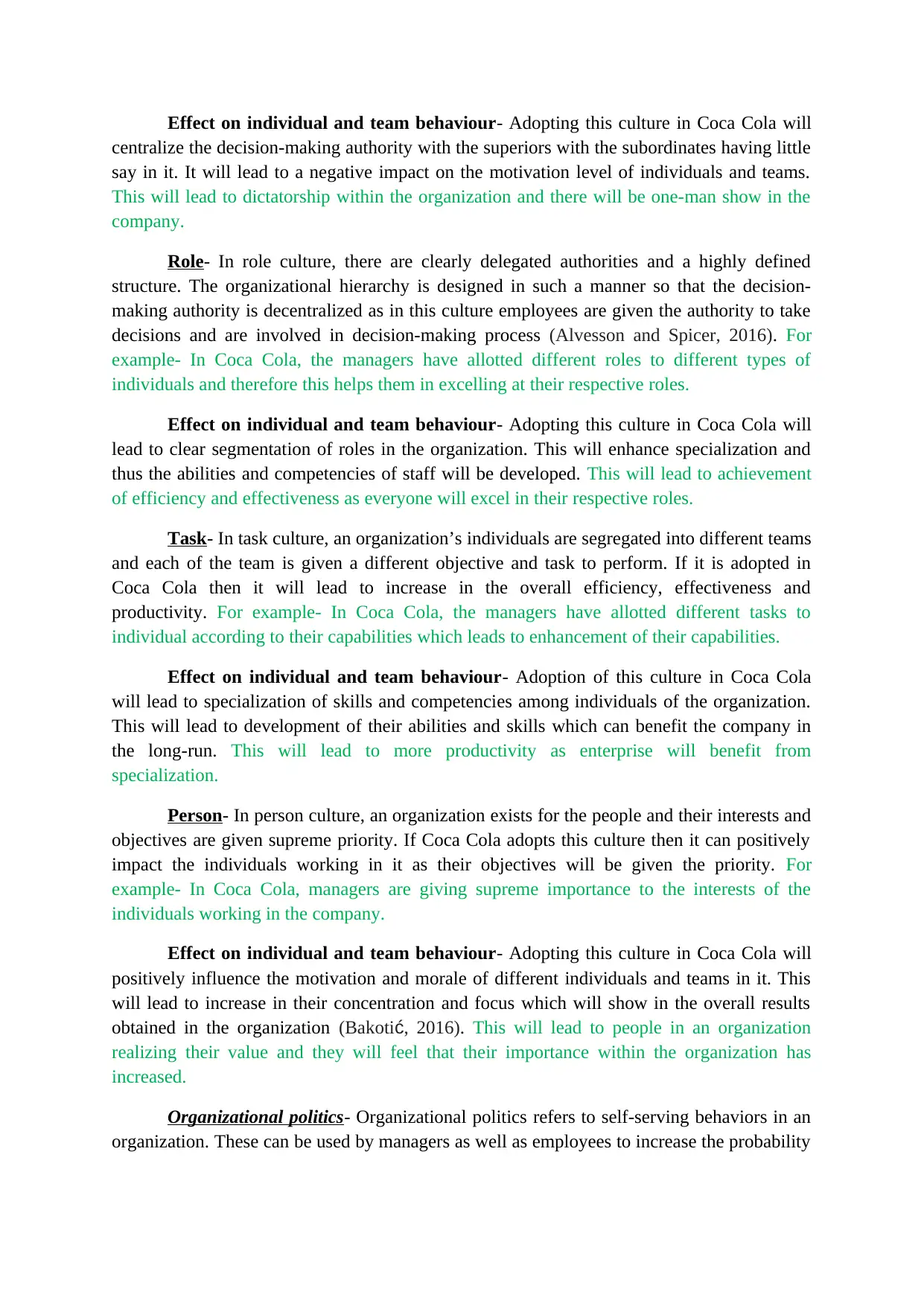
Effect on individual and team behaviour- Adopting this culture in Coca Cola will
centralize the decision-making authority with the superiors with the subordinates having little
say in it. It will lead to a negative impact on the motivation level of individuals and teams.
This will lead to dictatorship within the organization and there will be one-man show in the
company.
Role- In role culture, there are clearly delegated authorities and a highly defined
structure. The organizational hierarchy is designed in such a manner so that the decision-
making authority is decentralized as in this culture employees are given the authority to take
decisions and are involved in decision-making process (Alvesson and Spicer, 2016). For
example- In Coca Cola, the managers have allotted different roles to different types of
individuals and therefore this helps them in excelling at their respective roles.
Effect on individual and team behaviour- Adopting this culture in Coca Cola will
lead to clear segmentation of roles in the organization. This will enhance specialization and
thus the abilities and competencies of staff will be developed. This will lead to achievement
of efficiency and effectiveness as everyone will excel in their respective roles.
Task- In task culture, an organization’s individuals are segregated into different teams
and each of the team is given a different objective and task to perform. If it is adopted in
Coca Cola then it will lead to increase in the overall efficiency, effectiveness and
productivity. For example- In Coca Cola, the managers have allotted different tasks to
individual according to their capabilities which leads to enhancement of their capabilities.
Effect on individual and team behaviour- Adoption of this culture in Coca Cola
will lead to specialization of skills and competencies among individuals of the organization.
This will lead to development of their abilities and skills which can benefit the company in
the long-run. This will lead to more productivity as enterprise will benefit from
specialization.
Person- In person culture, an organization exists for the people and their interests and
objectives are given supreme priority. If Coca Cola adopts this culture then it can positively
impact the individuals working in it as their objectives will be given the priority. For
example- In Coca Cola, managers are giving supreme importance to the interests of the
individuals working in the company.
Effect on individual and team behaviour- Adopting this culture in Coca Cola will
positively influence the motivation and morale of different individuals and teams in it. This
will lead to increase in their concentration and focus which will show in the overall results
obtained in the organization (Bakotić, 2016). This will lead to people in an organization
realizing their value and they will feel that their importance within the organization has
increased.
Organizational politics- Organizational politics refers to self-serving behaviors in an
organization. These can be used by managers as well as employees to increase the probability
centralize the decision-making authority with the superiors with the subordinates having little
say in it. It will lead to a negative impact on the motivation level of individuals and teams.
This will lead to dictatorship within the organization and there will be one-man show in the
company.
Role- In role culture, there are clearly delegated authorities and a highly defined
structure. The organizational hierarchy is designed in such a manner so that the decision-
making authority is decentralized as in this culture employees are given the authority to take
decisions and are involved in decision-making process (Alvesson and Spicer, 2016). For
example- In Coca Cola, the managers have allotted different roles to different types of
individuals and therefore this helps them in excelling at their respective roles.
Effect on individual and team behaviour- Adopting this culture in Coca Cola will
lead to clear segmentation of roles in the organization. This will enhance specialization and
thus the abilities and competencies of staff will be developed. This will lead to achievement
of efficiency and effectiveness as everyone will excel in their respective roles.
Task- In task culture, an organization’s individuals are segregated into different teams
and each of the team is given a different objective and task to perform. If it is adopted in
Coca Cola then it will lead to increase in the overall efficiency, effectiveness and
productivity. For example- In Coca Cola, the managers have allotted different tasks to
individual according to their capabilities which leads to enhancement of their capabilities.
Effect on individual and team behaviour- Adoption of this culture in Coca Cola
will lead to specialization of skills and competencies among individuals of the organization.
This will lead to development of their abilities and skills which can benefit the company in
the long-run. This will lead to more productivity as enterprise will benefit from
specialization.
Person- In person culture, an organization exists for the people and their interests and
objectives are given supreme priority. If Coca Cola adopts this culture then it can positively
impact the individuals working in it as their objectives will be given the priority. For
example- In Coca Cola, managers are giving supreme importance to the interests of the
individuals working in the company.
Effect on individual and team behaviour- Adopting this culture in Coca Cola will
positively influence the motivation and morale of different individuals and teams in it. This
will lead to increase in their concentration and focus which will show in the overall results
obtained in the organization (Bakotić, 2016). This will lead to people in an organization
realizing their value and they will feel that their importance within the organization has
increased.
Organizational politics- Organizational politics refers to self-serving behaviors in an
organization. These can be used by managers as well as employees to increase the probability
Paraphrase This Document
Need a fresh take? Get an instant paraphrase of this document with our AI Paraphraser
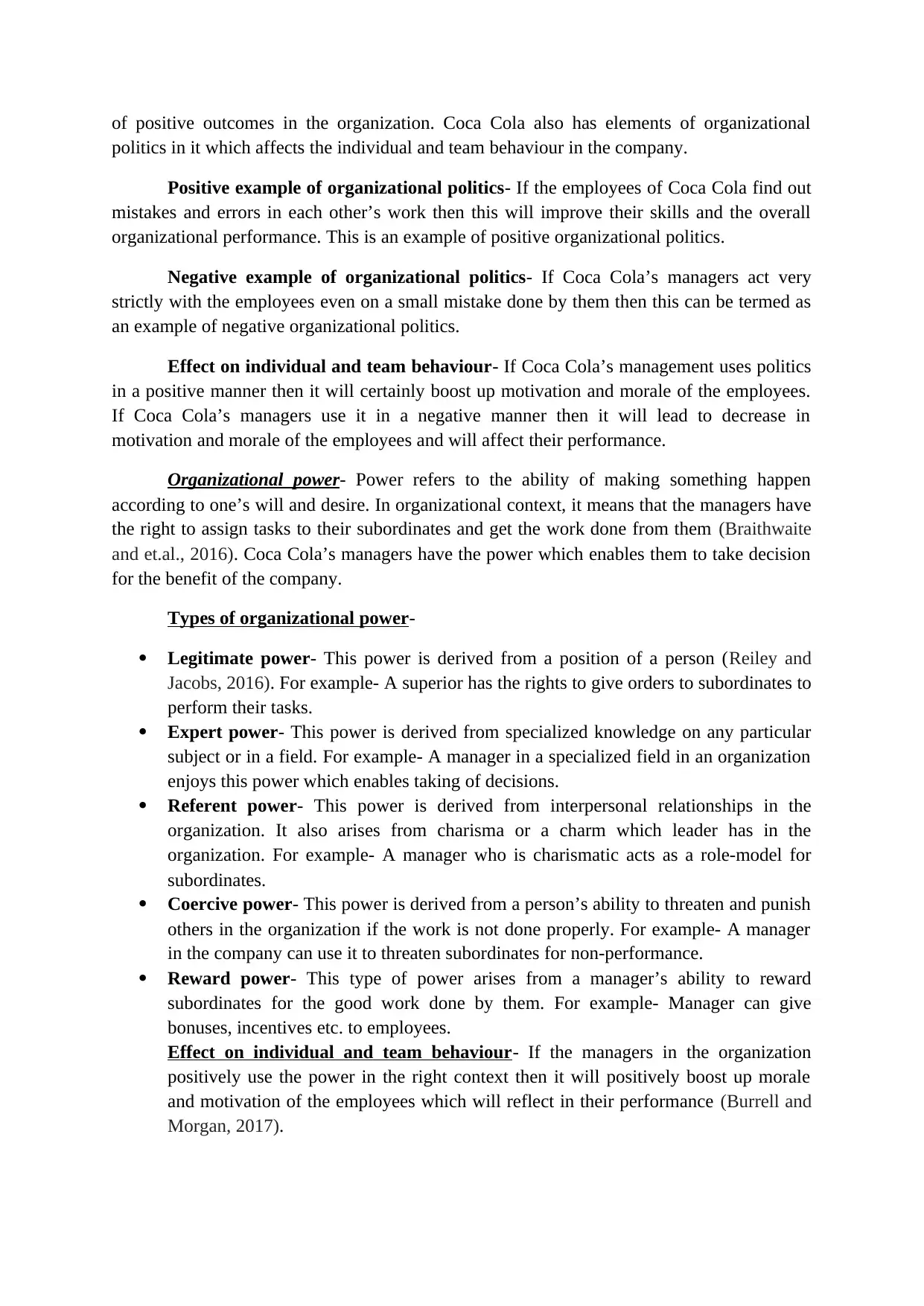
of positive outcomes in the organization. Coca Cola also has elements of organizational
politics in it which affects the individual and team behaviour in the company.
Positive example of organizational politics- If the employees of Coca Cola find out
mistakes and errors in each other’s work then this will improve their skills and the overall
organizational performance. This is an example of positive organizational politics.
Negative example of organizational politics- If Coca Cola’s managers act very
strictly with the employees even on a small mistake done by them then this can be termed as
an example of negative organizational politics.
Effect on individual and team behaviour- If Coca Cola’s management uses politics
in a positive manner then it will certainly boost up motivation and morale of the employees.
If Coca Cola’s managers use it in a negative manner then it will lead to decrease in
motivation and morale of the employees and will affect their performance.
Organizational power- Power refers to the ability of making something happen
according to one’s will and desire. In organizational context, it means that the managers have
the right to assign tasks to their subordinates and get the work done from them (Braithwaite
and et.al., 2016). Coca Cola’s managers have the power which enables them to take decision
for the benefit of the company.
Types of organizational power-
Legitimate power- This power is derived from a position of a person (Reiley and
Jacobs, 2016). For example- A superior has the rights to give orders to subordinates to
perform their tasks.
Expert power- This power is derived from specialized knowledge on any particular
subject or in a field. For example- A manager in a specialized field in an organization
enjoys this power which enables taking of decisions.
Referent power- This power is derived from interpersonal relationships in the
organization. It also arises from charisma or a charm which leader has in the
organization. For example- A manager who is charismatic acts as a role-model for
subordinates.
Coercive power- This power is derived from a person’s ability to threaten and punish
others in the organization if the work is not done properly. For example- A manager
in the company can use it to threaten subordinates for non-performance.
Reward power- This type of power arises from a manager’s ability to reward
subordinates for the good work done by them. For example- Manager can give
bonuses, incentives etc. to employees.
Effect on individual and team behaviour- If the managers in the organization
positively use the power in the right context then it will positively boost up morale
and motivation of the employees which will reflect in their performance (Burrell and
Morgan, 2017).
politics in it which affects the individual and team behaviour in the company.
Positive example of organizational politics- If the employees of Coca Cola find out
mistakes and errors in each other’s work then this will improve their skills and the overall
organizational performance. This is an example of positive organizational politics.
Negative example of organizational politics- If Coca Cola’s managers act very
strictly with the employees even on a small mistake done by them then this can be termed as
an example of negative organizational politics.
Effect on individual and team behaviour- If Coca Cola’s management uses politics
in a positive manner then it will certainly boost up motivation and morale of the employees.
If Coca Cola’s managers use it in a negative manner then it will lead to decrease in
motivation and morale of the employees and will affect their performance.
Organizational power- Power refers to the ability of making something happen
according to one’s will and desire. In organizational context, it means that the managers have
the right to assign tasks to their subordinates and get the work done from them (Braithwaite
and et.al., 2016). Coca Cola’s managers have the power which enables them to take decision
for the benefit of the company.
Types of organizational power-
Legitimate power- This power is derived from a position of a person (Reiley and
Jacobs, 2016). For example- A superior has the rights to give orders to subordinates to
perform their tasks.
Expert power- This power is derived from specialized knowledge on any particular
subject or in a field. For example- A manager in a specialized field in an organization
enjoys this power which enables taking of decisions.
Referent power- This power is derived from interpersonal relationships in the
organization. It also arises from charisma or a charm which leader has in the
organization. For example- A manager who is charismatic acts as a role-model for
subordinates.
Coercive power- This power is derived from a person’s ability to threaten and punish
others in the organization if the work is not done properly. For example- A manager
in the company can use it to threaten subordinates for non-performance.
Reward power- This type of power arises from a manager’s ability to reward
subordinates for the good work done by them. For example- Manager can give
bonuses, incentives etc. to employees.
Effect on individual and team behaviour- If the managers in the organization
positively use the power in the right context then it will positively boost up morale
and motivation of the employees which will reflect in their performance (Burrell and
Morgan, 2017).
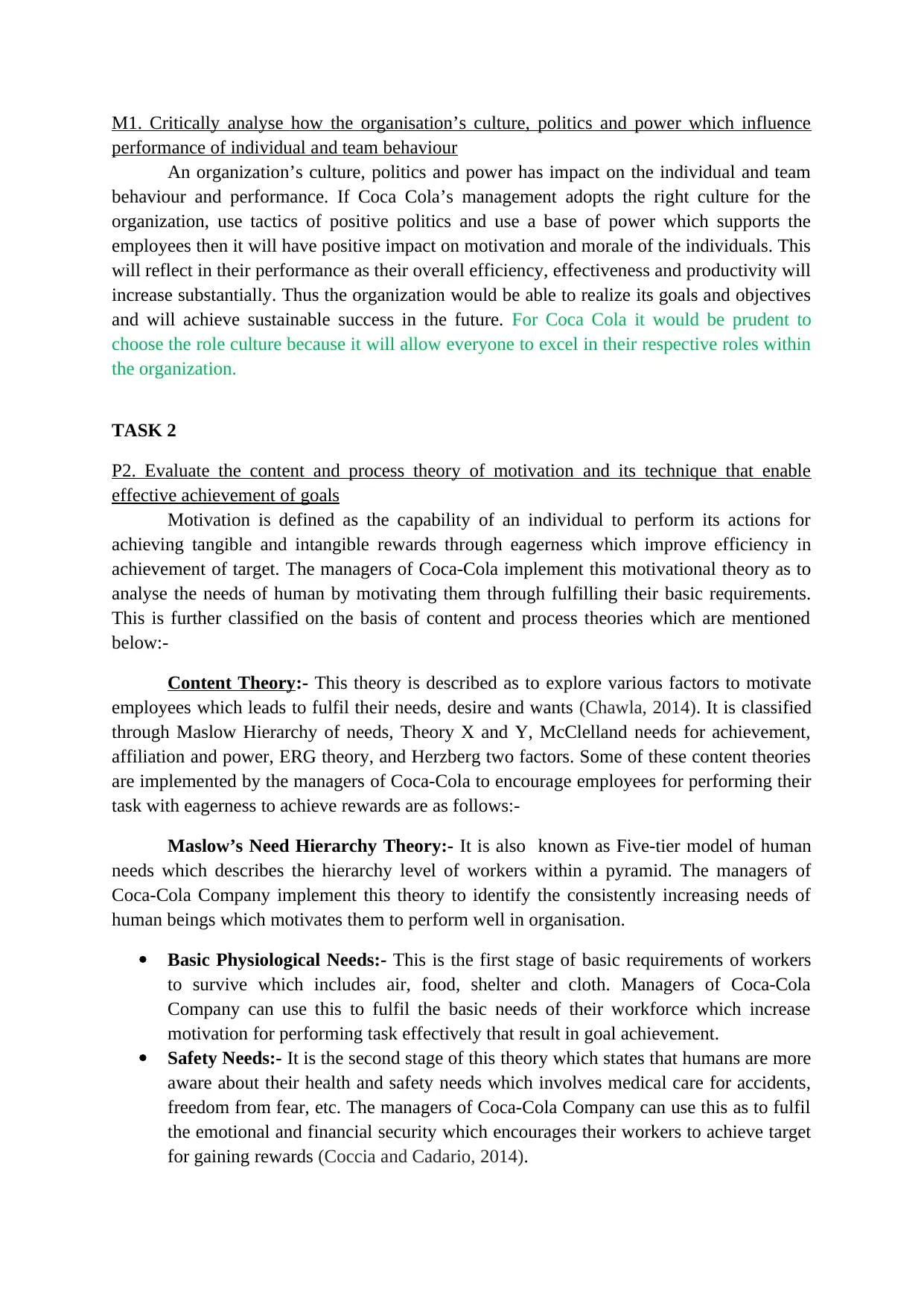
M1. Critically analyse how the organisation’s culture, politics and power which influence
performance of individual and team behaviour
An organization’s culture, politics and power has impact on the individual and team
behaviour and performance. If Coca Cola’s management adopts the right culture for the
organization, use tactics of positive politics and use a base of power which supports the
employees then it will have positive impact on motivation and morale of the individuals. This
will reflect in their performance as their overall efficiency, effectiveness and productivity will
increase substantially. Thus the organization would be able to realize its goals and objectives
and will achieve sustainable success in the future. For Coca Cola it would be prudent to
choose the role culture because it will allow everyone to excel in their respective roles within
the organization.
TASK 2
P2. Evaluate the content and process theory of motivation and its technique that enable
effective achievement of goals
Motivation is defined as the capability of an individual to perform its actions for
achieving tangible and intangible rewards through eagerness which improve efficiency in
achievement of target. The managers of Coca-Cola implement this motivational theory as to
analyse the needs of human by motivating them through fulfilling their basic requirements.
This is further classified on the basis of content and process theories which are mentioned
below:-
Content Theory:- This theory is described as to explore various factors to motivate
employees which leads to fulfil their needs, desire and wants (Chawla, 2014). It is classified
through Maslow Hierarchy of needs, Theory X and Y, McClelland needs for achievement,
affiliation and power, ERG theory, and Herzberg two factors. Some of these content theories
are implemented by the managers of Coca-Cola to encourage employees for performing their
task with eagerness to achieve rewards are as follows:-
Maslow’s Need Hierarchy Theory:- It is also known as Five-tier model of human
needs which describes the hierarchy level of workers within a pyramid. The managers of
Coca-Cola Company implement this theory to identify the consistently increasing needs of
human beings which motivates them to perform well in organisation.
Basic Physiological Needs:- This is the first stage of basic requirements of workers
to survive which includes air, food, shelter and cloth. Managers of Coca-Cola
Company can use this to fulfil the basic needs of their workforce which increase
motivation for performing task effectively that result in goal achievement.
Safety Needs:- It is the second stage of this theory which states that humans are more
aware about their health and safety needs which involves medical care for accidents,
freedom from fear, etc. The managers of Coca-Cola Company can use this as to fulfil
the emotional and financial security which encourages their workers to achieve target
for gaining rewards (Coccia and Cadario, 2014).
performance of individual and team behaviour
An organization’s culture, politics and power has impact on the individual and team
behaviour and performance. If Coca Cola’s management adopts the right culture for the
organization, use tactics of positive politics and use a base of power which supports the
employees then it will have positive impact on motivation and morale of the individuals. This
will reflect in their performance as their overall efficiency, effectiveness and productivity will
increase substantially. Thus the organization would be able to realize its goals and objectives
and will achieve sustainable success in the future. For Coca Cola it would be prudent to
choose the role culture because it will allow everyone to excel in their respective roles within
the organization.
TASK 2
P2. Evaluate the content and process theory of motivation and its technique that enable
effective achievement of goals
Motivation is defined as the capability of an individual to perform its actions for
achieving tangible and intangible rewards through eagerness which improve efficiency in
achievement of target. The managers of Coca-Cola implement this motivational theory as to
analyse the needs of human by motivating them through fulfilling their basic requirements.
This is further classified on the basis of content and process theories which are mentioned
below:-
Content Theory:- This theory is described as to explore various factors to motivate
employees which leads to fulfil their needs, desire and wants (Chawla, 2014). It is classified
through Maslow Hierarchy of needs, Theory X and Y, McClelland needs for achievement,
affiliation and power, ERG theory, and Herzberg two factors. Some of these content theories
are implemented by the managers of Coca-Cola to encourage employees for performing their
task with eagerness to achieve rewards are as follows:-
Maslow’s Need Hierarchy Theory:- It is also known as Five-tier model of human
needs which describes the hierarchy level of workers within a pyramid. The managers of
Coca-Cola Company implement this theory to identify the consistently increasing needs of
human beings which motivates them to perform well in organisation.
Basic Physiological Needs:- This is the first stage of basic requirements of workers
to survive which includes air, food, shelter and cloth. Managers of Coca-Cola
Company can use this to fulfil the basic needs of their workforce which increase
motivation for performing task effectively that result in goal achievement.
Safety Needs:- It is the second stage of this theory which states that humans are more
aware about their health and safety needs which involves medical care for accidents,
freedom from fear, etc. The managers of Coca-Cola Company can use this as to fulfil
the emotional and financial security which encourages their workers to achieve target
for gaining rewards (Coccia and Cadario, 2014).
⊘ This is a preview!⊘
Do you want full access?
Subscribe today to unlock all pages.

Trusted by 1+ million students worldwide
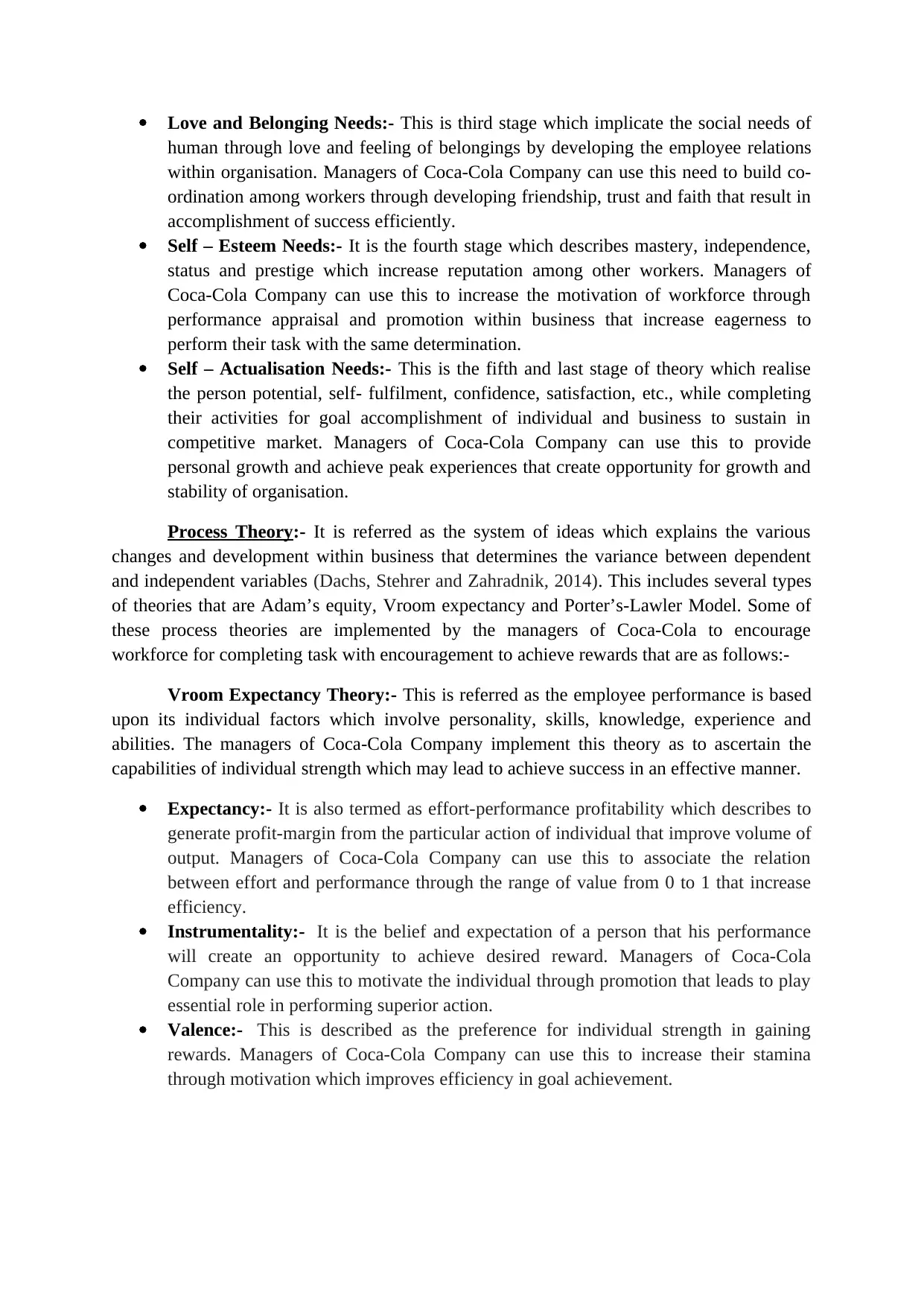
Love and Belonging Needs:- This is third stage which implicate the social needs of
human through love and feeling of belongings by developing the employee relations
within organisation. Managers of Coca-Cola Company can use this need to build co-
ordination among workers through developing friendship, trust and faith that result in
accomplishment of success efficiently.
Self – Esteem Needs:- It is the fourth stage which describes mastery, independence,
status and prestige which increase reputation among other workers. Managers of
Coca-Cola Company can use this to increase the motivation of workforce through
performance appraisal and promotion within business that increase eagerness to
perform their task with the same determination.
Self – Actualisation Needs:- This is the fifth and last stage of theory which realise
the person potential, self- fulfilment, confidence, satisfaction, etc., while completing
their activities for goal accomplishment of individual and business to sustain in
competitive market. Managers of Coca-Cola Company can use this to provide
personal growth and achieve peak experiences that create opportunity for growth and
stability of organisation.
Process Theory:- It is referred as the system of ideas which explains the various
changes and development within business that determines the variance between dependent
and independent variables (Dachs, Stehrer and Zahradnik, 2014). This includes several types
of theories that are Adam’s equity, Vroom expectancy and Porter’s-Lawler Model. Some of
these process theories are implemented by the managers of Coca-Cola to encourage
workforce for completing task with encouragement to achieve rewards that are as follows:-
Vroom Expectancy Theory:- This is referred as the employee performance is based
upon its individual factors which involve personality, skills, knowledge, experience and
abilities. The managers of Coca-Cola Company implement this theory as to ascertain the
capabilities of individual strength which may lead to achieve success in an effective manner.
Expectancy:- It is also termed as effort-performance profitability which describes to
generate profit-margin from the particular action of individual that improve volume of
output. Managers of Coca-Cola Company can use this to associate the relation
between effort and performance through the range of value from 0 to 1 that increase
efficiency.
Instrumentality:- It is the belief and expectation of a person that his performance
will create an opportunity to achieve desired reward. Managers of Coca-Cola
Company can use this to motivate the individual through promotion that leads to play
essential role in performing superior action.
Valence:- This is described as the preference for individual strength in gaining
rewards. Managers of Coca-Cola Company can use this to increase their stamina
through motivation which improves efficiency in goal achievement.
human through love and feeling of belongings by developing the employee relations
within organisation. Managers of Coca-Cola Company can use this need to build co-
ordination among workers through developing friendship, trust and faith that result in
accomplishment of success efficiently.
Self – Esteem Needs:- It is the fourth stage which describes mastery, independence,
status and prestige which increase reputation among other workers. Managers of
Coca-Cola Company can use this to increase the motivation of workforce through
performance appraisal and promotion within business that increase eagerness to
perform their task with the same determination.
Self – Actualisation Needs:- This is the fifth and last stage of theory which realise
the person potential, self- fulfilment, confidence, satisfaction, etc., while completing
their activities for goal accomplishment of individual and business to sustain in
competitive market. Managers of Coca-Cola Company can use this to provide
personal growth and achieve peak experiences that create opportunity for growth and
stability of organisation.
Process Theory:- It is referred as the system of ideas which explains the various
changes and development within business that determines the variance between dependent
and independent variables (Dachs, Stehrer and Zahradnik, 2014). This includes several types
of theories that are Adam’s equity, Vroom expectancy and Porter’s-Lawler Model. Some of
these process theories are implemented by the managers of Coca-Cola to encourage
workforce for completing task with encouragement to achieve rewards that are as follows:-
Vroom Expectancy Theory:- This is referred as the employee performance is based
upon its individual factors which involve personality, skills, knowledge, experience and
abilities. The managers of Coca-Cola Company implement this theory as to ascertain the
capabilities of individual strength which may lead to achieve success in an effective manner.
Expectancy:- It is also termed as effort-performance profitability which describes to
generate profit-margin from the particular action of individual that improve volume of
output. Managers of Coca-Cola Company can use this to associate the relation
between effort and performance through the range of value from 0 to 1 that increase
efficiency.
Instrumentality:- It is the belief and expectation of a person that his performance
will create an opportunity to achieve desired reward. Managers of Coca-Cola
Company can use this to motivate the individual through promotion that leads to play
essential role in performing superior action.
Valence:- This is described as the preference for individual strength in gaining
rewards. Managers of Coca-Cola Company can use this to increase their stamina
through motivation which improves efficiency in goal achievement.
Paraphrase This Document
Need a fresh take? Get an instant paraphrase of this document with our AI Paraphraser
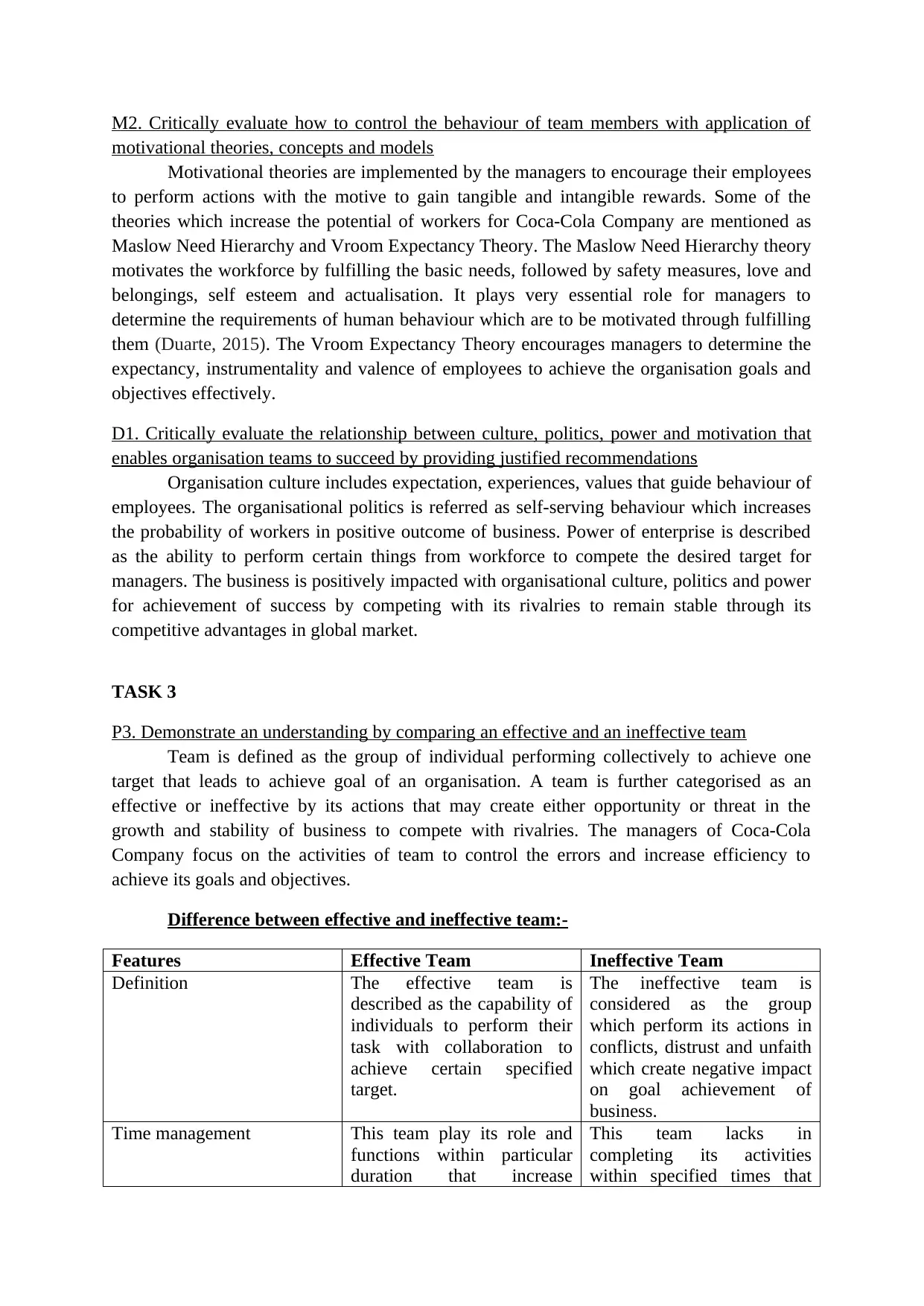
M2. Critically evaluate how to control the behaviour of team members with application of
motivational theories, concepts and models
Motivational theories are implemented by the managers to encourage their employees
to perform actions with the motive to gain tangible and intangible rewards. Some of the
theories which increase the potential of workers for Coca-Cola Company are mentioned as
Maslow Need Hierarchy and Vroom Expectancy Theory. The Maslow Need Hierarchy theory
motivates the workforce by fulfilling the basic needs, followed by safety measures, love and
belongings, self esteem and actualisation. It plays very essential role for managers to
determine the requirements of human behaviour which are to be motivated through fulfilling
them (Duarte, 2015). The Vroom Expectancy Theory encourages managers to determine the
expectancy, instrumentality and valence of employees to achieve the organisation goals and
objectives effectively.
D1. Critically evaluate the relationship between culture, politics, power and motivation that
enables organisation teams to succeed by providing justified recommendations
Organisation culture includes expectation, experiences, values that guide behaviour of
employees. The organisational politics is referred as self-serving behaviour which increases
the probability of workers in positive outcome of business. Power of enterprise is described
as the ability to perform certain things from workforce to compete the desired target for
managers. The business is positively impacted with organisational culture, politics and power
for achievement of success by competing with its rivalries to remain stable through its
competitive advantages in global market.
TASK 3
P3. Demonstrate an understanding by comparing an effective and an ineffective team
Team is defined as the group of individual performing collectively to achieve one
target that leads to achieve goal of an organisation. A team is further categorised as an
effective or ineffective by its actions that may create either opportunity or threat in the
growth and stability of business to compete with rivalries. The managers of Coca-Cola
Company focus on the activities of team to control the errors and increase efficiency to
achieve its goals and objectives.
Difference between effective and ineffective team:-
Features Effective Team Ineffective Team
Definition The effective team is
described as the capability of
individuals to perform their
task with collaboration to
achieve certain specified
target.
The ineffective team is
considered as the group
which perform its actions in
conflicts, distrust and unfaith
which create negative impact
on goal achievement of
business.
Time management This team play its role and
functions within particular
duration that increase
This team lacks in
completing its activities
within specified times that
motivational theories, concepts and models
Motivational theories are implemented by the managers to encourage their employees
to perform actions with the motive to gain tangible and intangible rewards. Some of the
theories which increase the potential of workers for Coca-Cola Company are mentioned as
Maslow Need Hierarchy and Vroom Expectancy Theory. The Maslow Need Hierarchy theory
motivates the workforce by fulfilling the basic needs, followed by safety measures, love and
belongings, self esteem and actualisation. It plays very essential role for managers to
determine the requirements of human behaviour which are to be motivated through fulfilling
them (Duarte, 2015). The Vroom Expectancy Theory encourages managers to determine the
expectancy, instrumentality and valence of employees to achieve the organisation goals and
objectives effectively.
D1. Critically evaluate the relationship between culture, politics, power and motivation that
enables organisation teams to succeed by providing justified recommendations
Organisation culture includes expectation, experiences, values that guide behaviour of
employees. The organisational politics is referred as self-serving behaviour which increases
the probability of workers in positive outcome of business. Power of enterprise is described
as the ability to perform certain things from workforce to compete the desired target for
managers. The business is positively impacted with organisational culture, politics and power
for achievement of success by competing with its rivalries to remain stable through its
competitive advantages in global market.
TASK 3
P3. Demonstrate an understanding by comparing an effective and an ineffective team
Team is defined as the group of individual performing collectively to achieve one
target that leads to achieve goal of an organisation. A team is further categorised as an
effective or ineffective by its actions that may create either opportunity or threat in the
growth and stability of business to compete with rivalries. The managers of Coca-Cola
Company focus on the activities of team to control the errors and increase efficiency to
achieve its goals and objectives.
Difference between effective and ineffective team:-
Features Effective Team Ineffective Team
Definition The effective team is
described as the capability of
individuals to perform their
task with collaboration to
achieve certain specified
target.
The ineffective team is
considered as the group
which perform its actions in
conflicts, distrust and unfaith
which create negative impact
on goal achievement of
business.
Time management This team play its role and
functions within particular
duration that increase
This team lacks in
completing its activities
within specified times that
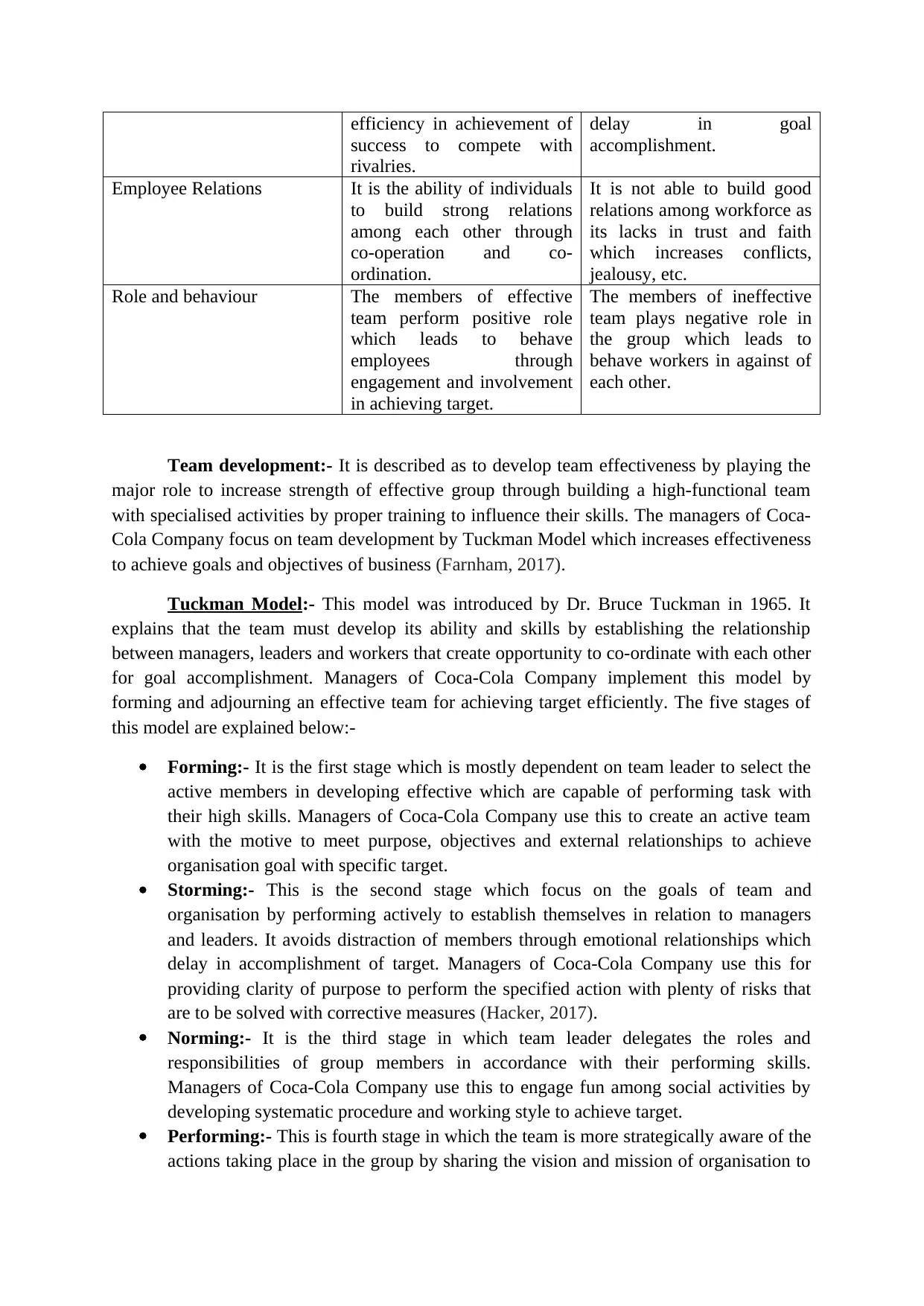
efficiency in achievement of
success to compete with
rivalries.
delay in goal
accomplishment.
Employee Relations It is the ability of individuals
to build strong relations
among each other through
co-operation and co-
ordination.
It is not able to build good
relations among workforce as
its lacks in trust and faith
which increases conflicts,
jealousy, etc.
Role and behaviour The members of effective
team perform positive role
which leads to behave
employees through
engagement and involvement
in achieving target.
The members of ineffective
team plays negative role in
the group which leads to
behave workers in against of
each other.
Team development:- It is described as to develop team effectiveness by playing the
major role to increase strength of effective group through building a high-functional team
with specialised activities by proper training to influence their skills. The managers of Coca-
Cola Company focus on team development by Tuckman Model which increases effectiveness
to achieve goals and objectives of business (Farnham, 2017).
Tuckman Model:- This model was introduced by Dr. Bruce Tuckman in 1965. It
explains that the team must develop its ability and skills by establishing the relationship
between managers, leaders and workers that create opportunity to co-ordinate with each other
for goal accomplishment. Managers of Coca-Cola Company implement this model by
forming and adjourning an effective team for achieving target efficiently. The five stages of
this model are explained below:-
Forming:- It is the first stage which is mostly dependent on team leader to select the
active members in developing effective which are capable of performing task with
their high skills. Managers of Coca-Cola Company use this to create an active team
with the motive to meet purpose, objectives and external relationships to achieve
organisation goal with specific target.
Storming:- This is the second stage which focus on the goals of team and
organisation by performing actively to establish themselves in relation to managers
and leaders. It avoids distraction of members through emotional relationships which
delay in accomplishment of target. Managers of Coca-Cola Company use this for
providing clarity of purpose to perform the specified action with plenty of risks that
are to be solved with corrective measures (Hacker, 2017).
Norming:- It is the third stage in which team leader delegates the roles and
responsibilities of group members in accordance with their performing skills.
Managers of Coca-Cola Company use this to engage fun among social activities by
developing systematic procedure and working style to achieve target.
Performing:- This is fourth stage in which the team is more strategically aware of the
actions taking place in the group by sharing the vision and mission of organisation to
success to compete with
rivalries.
delay in goal
accomplishment.
Employee Relations It is the ability of individuals
to build strong relations
among each other through
co-operation and co-
ordination.
It is not able to build good
relations among workforce as
its lacks in trust and faith
which increases conflicts,
jealousy, etc.
Role and behaviour The members of effective
team perform positive role
which leads to behave
employees through
engagement and involvement
in achieving target.
The members of ineffective
team plays negative role in
the group which leads to
behave workers in against of
each other.
Team development:- It is described as to develop team effectiveness by playing the
major role to increase strength of effective group through building a high-functional team
with specialised activities by proper training to influence their skills. The managers of Coca-
Cola Company focus on team development by Tuckman Model which increases effectiveness
to achieve goals and objectives of business (Farnham, 2017).
Tuckman Model:- This model was introduced by Dr. Bruce Tuckman in 1965. It
explains that the team must develop its ability and skills by establishing the relationship
between managers, leaders and workers that create opportunity to co-ordinate with each other
for goal accomplishment. Managers of Coca-Cola Company implement this model by
forming and adjourning an effective team for achieving target efficiently. The five stages of
this model are explained below:-
Forming:- It is the first stage which is mostly dependent on team leader to select the
active members in developing effective which are capable of performing task with
their high skills. Managers of Coca-Cola Company use this to create an active team
with the motive to meet purpose, objectives and external relationships to achieve
organisation goal with specific target.
Storming:- This is the second stage which focus on the goals of team and
organisation by performing actively to establish themselves in relation to managers
and leaders. It avoids distraction of members through emotional relationships which
delay in accomplishment of target. Managers of Coca-Cola Company use this for
providing clarity of purpose to perform the specified action with plenty of risks that
are to be solved with corrective measures (Hacker, 2017).
Norming:- It is the third stage in which team leader delegates the roles and
responsibilities of group members in accordance with their performing skills.
Managers of Coca-Cola Company use this to engage fun among social activities by
developing systematic procedure and working style to achieve target.
Performing:- This is fourth stage in which the team is more strategically aware of the
actions taking place in the group by sharing the vision and mission of organisation to
⊘ This is a preview!⊘
Do you want full access?
Subscribe today to unlock all pages.

Trusted by 1+ million students worldwide
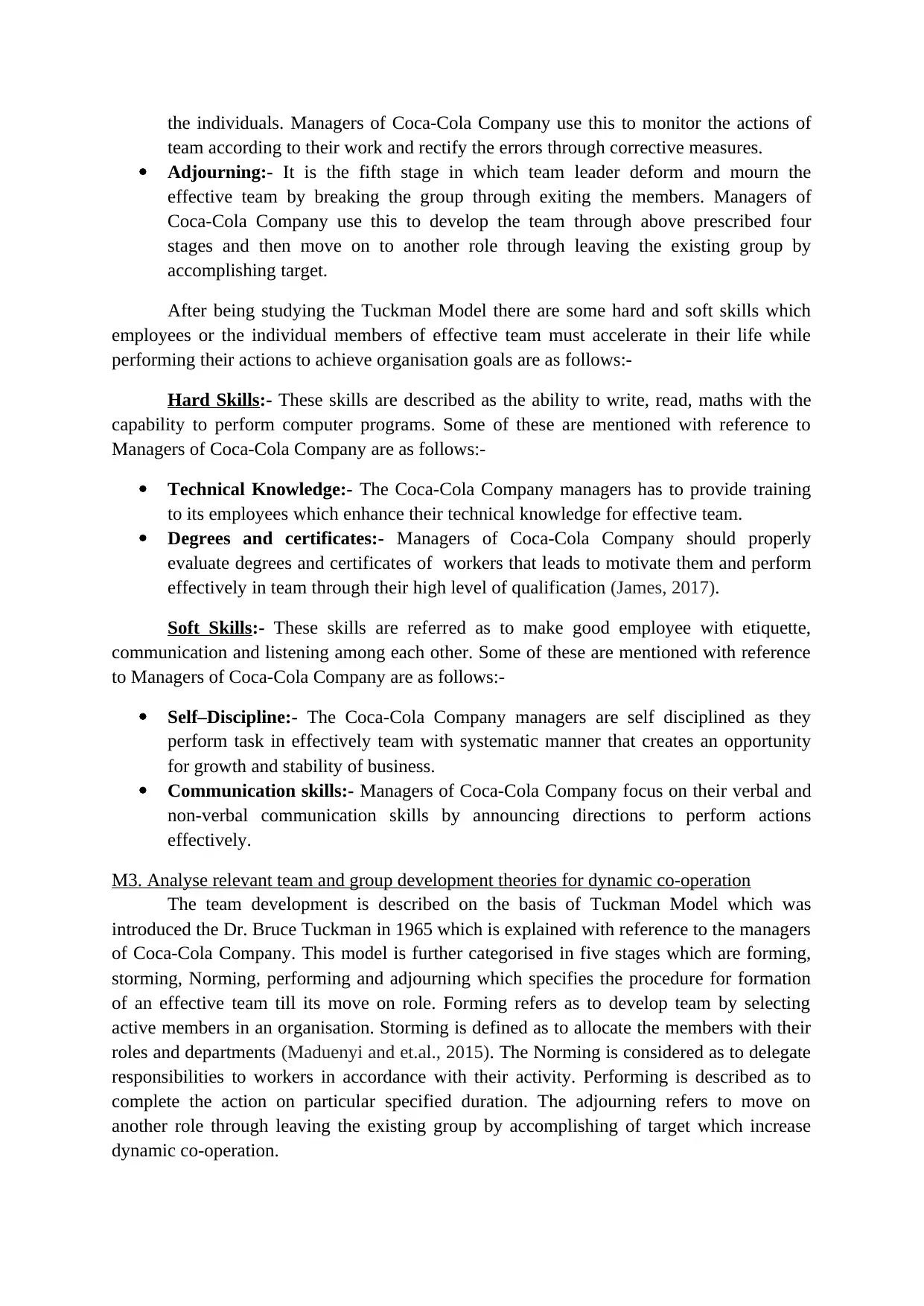
the individuals. Managers of Coca-Cola Company use this to monitor the actions of
team according to their work and rectify the errors through corrective measures.
Adjourning:- It is the fifth stage in which team leader deform and mourn the
effective team by breaking the group through exiting the members. Managers of
Coca-Cola Company use this to develop the team through above prescribed four
stages and then move on to another role through leaving the existing group by
accomplishing target.
After being studying the Tuckman Model there are some hard and soft skills which
employees or the individual members of effective team must accelerate in their life while
performing their actions to achieve organisation goals are as follows:-
Hard Skills:- These skills are described as the ability to write, read, maths with the
capability to perform computer programs. Some of these are mentioned with reference to
Managers of Coca-Cola Company are as follows:-
Technical Knowledge:- The Coca-Cola Company managers has to provide training
to its employees which enhance their technical knowledge for effective team.
Degrees and certificates:- Managers of Coca-Cola Company should properly
evaluate degrees and certificates of workers that leads to motivate them and perform
effectively in team through their high level of qualification (James, 2017).
Soft Skills:- These skills are referred as to make good employee with etiquette,
communication and listening among each other. Some of these are mentioned with reference
to Managers of Coca-Cola Company are as follows:-
Self–Discipline:- The Coca-Cola Company managers are self disciplined as they
perform task in effectively team with systematic manner that creates an opportunity
for growth and stability of business.
Communication skills:- Managers of Coca-Cola Company focus on their verbal and
non-verbal communication skills by announcing directions to perform actions
effectively.
M3. Analyse relevant team and group development theories for dynamic co-operation
The team development is described on the basis of Tuckman Model which was
introduced the Dr. Bruce Tuckman in 1965 which is explained with reference to the managers
of Coca-Cola Company. This model is further categorised in five stages which are forming,
storming, Norming, performing and adjourning which specifies the procedure for formation
of an effective team till its move on role. Forming refers as to develop team by selecting
active members in an organisation. Storming is defined as to allocate the members with their
roles and departments (Maduenyi and et.al., 2015). The Norming is considered as to delegate
responsibilities to workers in accordance with their activity. Performing is described as to
complete the action on particular specified duration. The adjourning refers to move on
another role through leaving the existing group by accomplishing of target which increase
dynamic co-operation.
team according to their work and rectify the errors through corrective measures.
Adjourning:- It is the fifth stage in which team leader deform and mourn the
effective team by breaking the group through exiting the members. Managers of
Coca-Cola Company use this to develop the team through above prescribed four
stages and then move on to another role through leaving the existing group by
accomplishing target.
After being studying the Tuckman Model there are some hard and soft skills which
employees or the individual members of effective team must accelerate in their life while
performing their actions to achieve organisation goals are as follows:-
Hard Skills:- These skills are described as the ability to write, read, maths with the
capability to perform computer programs. Some of these are mentioned with reference to
Managers of Coca-Cola Company are as follows:-
Technical Knowledge:- The Coca-Cola Company managers has to provide training
to its employees which enhance their technical knowledge for effective team.
Degrees and certificates:- Managers of Coca-Cola Company should properly
evaluate degrees and certificates of workers that leads to motivate them and perform
effectively in team through their high level of qualification (James, 2017).
Soft Skills:- These skills are referred as to make good employee with etiquette,
communication and listening among each other. Some of these are mentioned with reference
to Managers of Coca-Cola Company are as follows:-
Self–Discipline:- The Coca-Cola Company managers are self disciplined as they
perform task in effectively team with systematic manner that creates an opportunity
for growth and stability of business.
Communication skills:- Managers of Coca-Cola Company focus on their verbal and
non-verbal communication skills by announcing directions to perform actions
effectively.
M3. Analyse relevant team and group development theories for dynamic co-operation
The team development is described on the basis of Tuckman Model which was
introduced the Dr. Bruce Tuckman in 1965 which is explained with reference to the managers
of Coca-Cola Company. This model is further categorised in five stages which are forming,
storming, Norming, performing and adjourning which specifies the procedure for formation
of an effective team till its move on role. Forming refers as to develop team by selecting
active members in an organisation. Storming is defined as to allocate the members with their
roles and departments (Maduenyi and et.al., 2015). The Norming is considered as to delegate
responsibilities to workers in accordance with their activity. Performing is described as to
complete the action on particular specified duration. The adjourning refers to move on
another role through leaving the existing group by accomplishing of target which increase
dynamic co-operation.
Paraphrase This Document
Need a fresh take? Get an instant paraphrase of this document with our AI Paraphraser
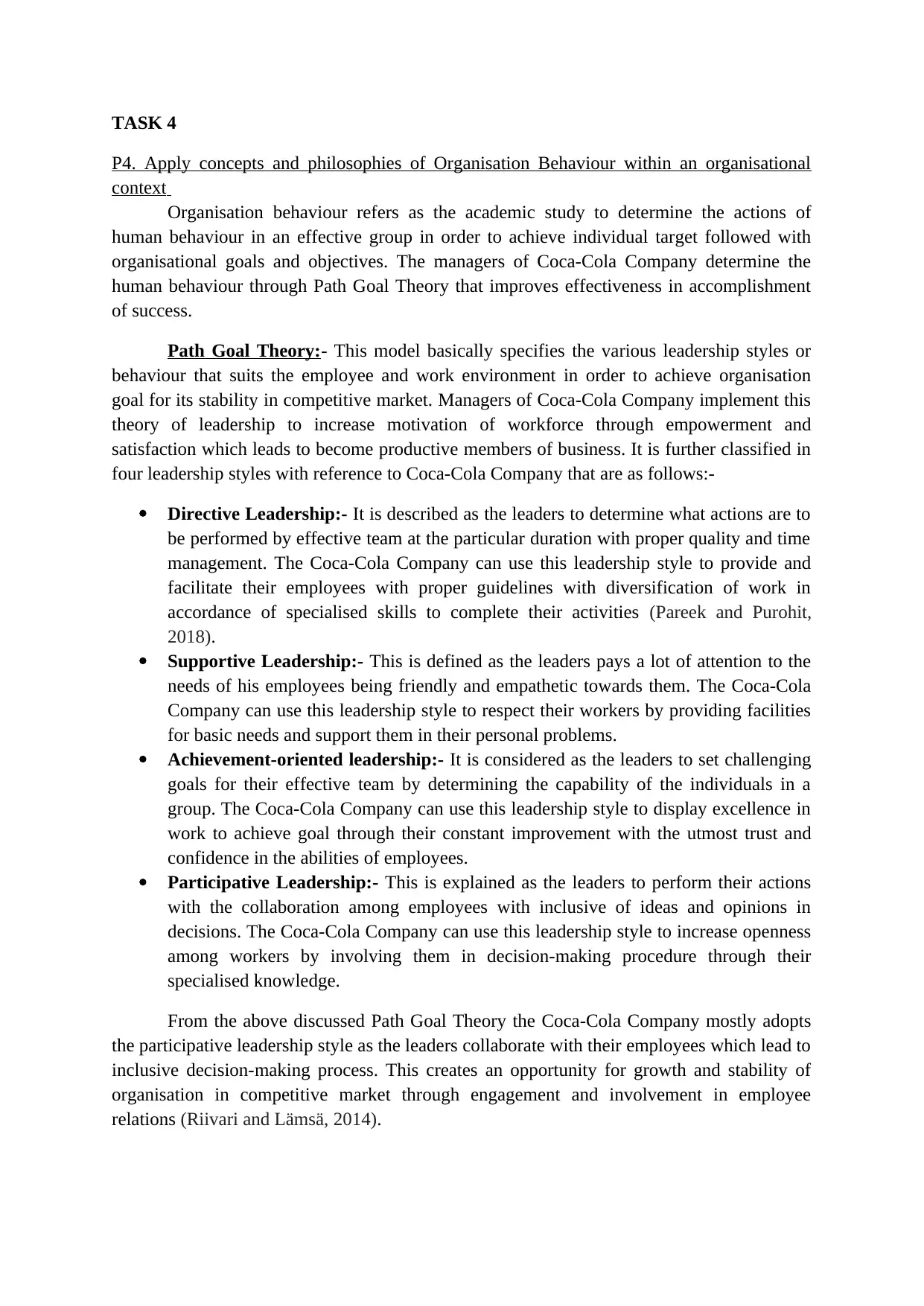
TASK 4
P4. Apply concepts and philosophies of Organisation Behaviour within an organisational
context
Organisation behaviour refers as the academic study to determine the actions of
human behaviour in an effective group in order to achieve individual target followed with
organisational goals and objectives. The managers of Coca-Cola Company determine the
human behaviour through Path Goal Theory that improves effectiveness in accomplishment
of success.
Path Goal Theory:- This model basically specifies the various leadership styles or
behaviour that suits the employee and work environment in order to achieve organisation
goal for its stability in competitive market. Managers of Coca-Cola Company implement this
theory of leadership to increase motivation of workforce through empowerment and
satisfaction which leads to become productive members of business. It is further classified in
four leadership styles with reference to Coca-Cola Company that are as follows:-
Directive Leadership:- It is described as the leaders to determine what actions are to
be performed by effective team at the particular duration with proper quality and time
management. The Coca-Cola Company can use this leadership style to provide and
facilitate their employees with proper guidelines with diversification of work in
accordance of specialised skills to complete their activities (Pareek and Purohit,
2018).
Supportive Leadership:- This is defined as the leaders pays a lot of attention to the
needs of his employees being friendly and empathetic towards them. The Coca-Cola
Company can use this leadership style to respect their workers by providing facilities
for basic needs and support them in their personal problems.
Achievement-oriented leadership:- It is considered as the leaders to set challenging
goals for their effective team by determining the capability of the individuals in a
group. The Coca-Cola Company can use this leadership style to display excellence in
work to achieve goal through their constant improvement with the utmost trust and
confidence in the abilities of employees.
Participative Leadership:- This is explained as the leaders to perform their actions
with the collaboration among employees with inclusive of ideas and opinions in
decisions. The Coca-Cola Company can use this leadership style to increase openness
among workers by involving them in decision-making procedure through their
specialised knowledge.
From the above discussed Path Goal Theory the Coca-Cola Company mostly adopts
the participative leadership style as the leaders collaborate with their employees which lead to
inclusive decision-making process. This creates an opportunity for growth and stability of
organisation in competitive market through engagement and involvement in employee
relations (Riivari and Lämsä, 2014).
P4. Apply concepts and philosophies of Organisation Behaviour within an organisational
context
Organisation behaviour refers as the academic study to determine the actions of
human behaviour in an effective group in order to achieve individual target followed with
organisational goals and objectives. The managers of Coca-Cola Company determine the
human behaviour through Path Goal Theory that improves effectiveness in accomplishment
of success.
Path Goal Theory:- This model basically specifies the various leadership styles or
behaviour that suits the employee and work environment in order to achieve organisation
goal for its stability in competitive market. Managers of Coca-Cola Company implement this
theory of leadership to increase motivation of workforce through empowerment and
satisfaction which leads to become productive members of business. It is further classified in
four leadership styles with reference to Coca-Cola Company that are as follows:-
Directive Leadership:- It is described as the leaders to determine what actions are to
be performed by effective team at the particular duration with proper quality and time
management. The Coca-Cola Company can use this leadership style to provide and
facilitate their employees with proper guidelines with diversification of work in
accordance of specialised skills to complete their activities (Pareek and Purohit,
2018).
Supportive Leadership:- This is defined as the leaders pays a lot of attention to the
needs of his employees being friendly and empathetic towards them. The Coca-Cola
Company can use this leadership style to respect their workers by providing facilities
for basic needs and support them in their personal problems.
Achievement-oriented leadership:- It is considered as the leaders to set challenging
goals for their effective team by determining the capability of the individuals in a
group. The Coca-Cola Company can use this leadership style to display excellence in
work to achieve goal through their constant improvement with the utmost trust and
confidence in the abilities of employees.
Participative Leadership:- This is explained as the leaders to perform their actions
with the collaboration among employees with inclusive of ideas and opinions in
decisions. The Coca-Cola Company can use this leadership style to increase openness
among workers by involving them in decision-making procedure through their
specialised knowledge.
From the above discussed Path Goal Theory the Coca-Cola Company mostly adopts
the participative leadership style as the leaders collaborate with their employees which lead to
inclusive decision-making process. This creates an opportunity for growth and stability of
organisation in competitive market through engagement and involvement in employee
relations (Riivari and Lämsä, 2014).
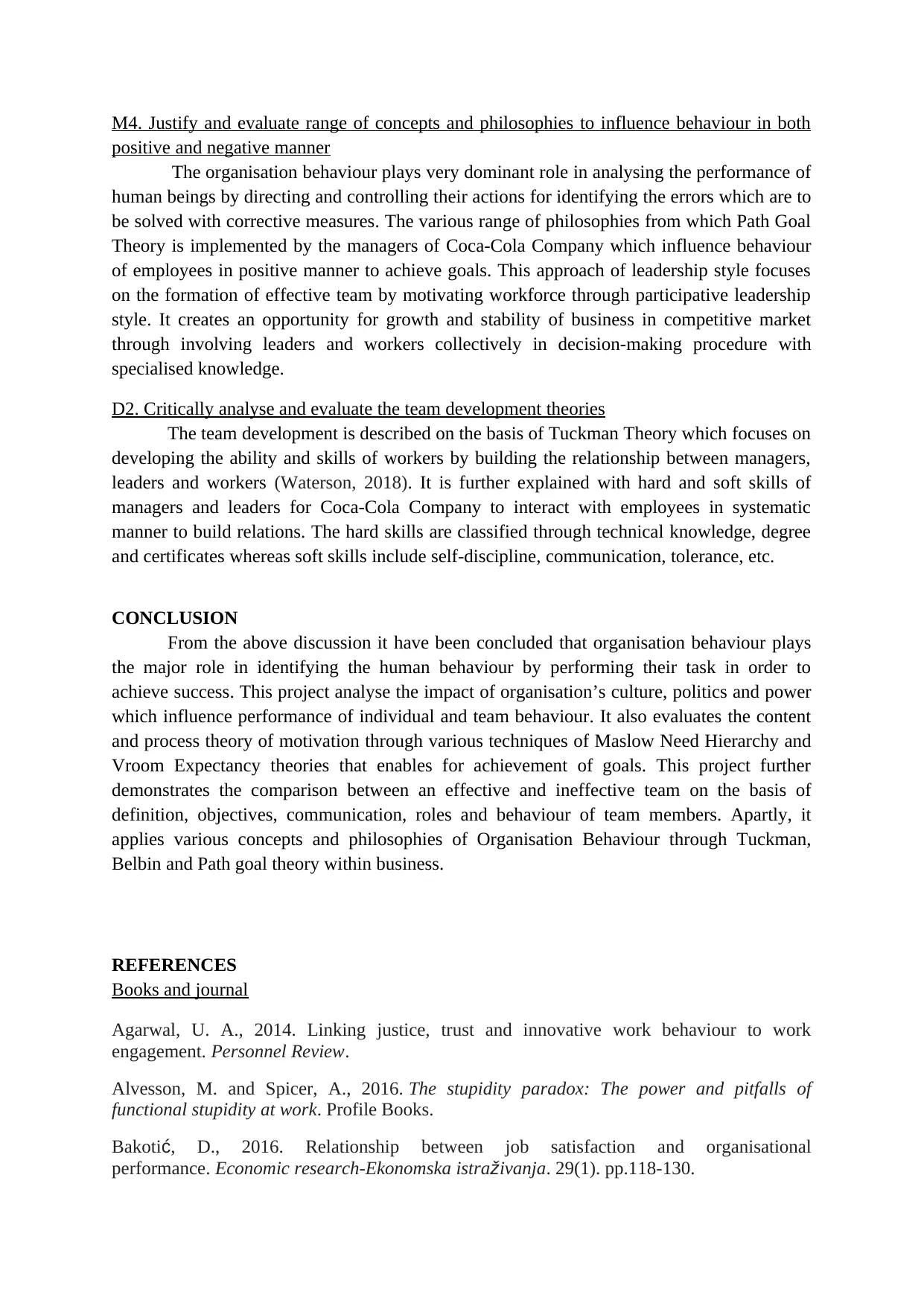
M4. Justify and evaluate range of concepts and philosophies to influence behaviour in both
positive and negative manner
The organisation behaviour plays very dominant role in analysing the performance of
human beings by directing and controlling their actions for identifying the errors which are to
be solved with corrective measures. The various range of philosophies from which Path Goal
Theory is implemented by the managers of Coca-Cola Company which influence behaviour
of employees in positive manner to achieve goals. This approach of leadership style focuses
on the formation of effective team by motivating workforce through participative leadership
style. It creates an opportunity for growth and stability of business in competitive market
through involving leaders and workers collectively in decision-making procedure with
specialised knowledge.
D2. Critically analyse and evaluate the team development theories
The team development is described on the basis of Tuckman Theory which focuses on
developing the ability and skills of workers by building the relationship between managers,
leaders and workers (Waterson, 2018). It is further explained with hard and soft skills of
managers and leaders for Coca-Cola Company to interact with employees in systematic
manner to build relations. The hard skills are classified through technical knowledge, degree
and certificates whereas soft skills include self-discipline, communication, tolerance, etc.
CONCLUSION
From the above discussion it have been concluded that organisation behaviour plays
the major role in identifying the human behaviour by performing their task in order to
achieve success. This project analyse the impact of organisation’s culture, politics and power
which influence performance of individual and team behaviour. It also evaluates the content
and process theory of motivation through various techniques of Maslow Need Hierarchy and
Vroom Expectancy theories that enables for achievement of goals. This project further
demonstrates the comparison between an effective and ineffective team on the basis of
definition, objectives, communication, roles and behaviour of team members. Apartly, it
applies various concepts and philosophies of Organisation Behaviour through Tuckman,
Belbin and Path goal theory within business.
REFERENCES
Books and journal
Agarwal, U. A., 2014. Linking justice, trust and innovative work behaviour to work
engagement. Personnel Review.
Alvesson, M. and Spicer, A., 2016. The stupidity paradox: The power and pitfalls of
functional stupidity at work. Profile Books.
Bakotić, D., 2016. Relationship between job satisfaction and organisational
performance. Economic research-Ekonomska istraživanja. 29(1). pp.118-130.
positive and negative manner
The organisation behaviour plays very dominant role in analysing the performance of
human beings by directing and controlling their actions for identifying the errors which are to
be solved with corrective measures. The various range of philosophies from which Path Goal
Theory is implemented by the managers of Coca-Cola Company which influence behaviour
of employees in positive manner to achieve goals. This approach of leadership style focuses
on the formation of effective team by motivating workforce through participative leadership
style. It creates an opportunity for growth and stability of business in competitive market
through involving leaders and workers collectively in decision-making procedure with
specialised knowledge.
D2. Critically analyse and evaluate the team development theories
The team development is described on the basis of Tuckman Theory which focuses on
developing the ability and skills of workers by building the relationship between managers,
leaders and workers (Waterson, 2018). It is further explained with hard and soft skills of
managers and leaders for Coca-Cola Company to interact with employees in systematic
manner to build relations. The hard skills are classified through technical knowledge, degree
and certificates whereas soft skills include self-discipline, communication, tolerance, etc.
CONCLUSION
From the above discussion it have been concluded that organisation behaviour plays
the major role in identifying the human behaviour by performing their task in order to
achieve success. This project analyse the impact of organisation’s culture, politics and power
which influence performance of individual and team behaviour. It also evaluates the content
and process theory of motivation through various techniques of Maslow Need Hierarchy and
Vroom Expectancy theories that enables for achievement of goals. This project further
demonstrates the comparison between an effective and ineffective team on the basis of
definition, objectives, communication, roles and behaviour of team members. Apartly, it
applies various concepts and philosophies of Organisation Behaviour through Tuckman,
Belbin and Path goal theory within business.
REFERENCES
Books and journal
Agarwal, U. A., 2014. Linking justice, trust and innovative work behaviour to work
engagement. Personnel Review.
Alvesson, M. and Spicer, A., 2016. The stupidity paradox: The power and pitfalls of
functional stupidity at work. Profile Books.
Bakotić, D., 2016. Relationship between job satisfaction and organisational
performance. Economic research-Ekonomska istraživanja. 29(1). pp.118-130.
⊘ This is a preview!⊘
Do you want full access?
Subscribe today to unlock all pages.

Trusted by 1+ million students worldwide
1 out of 13
Related Documents
Your All-in-One AI-Powered Toolkit for Academic Success.
+13062052269
info@desklib.com
Available 24*7 on WhatsApp / Email
![[object Object]](/_next/static/media/star-bottom.7253800d.svg)
Unlock your academic potential
Copyright © 2020–2026 A2Z Services. All Rights Reserved. Developed and managed by ZUCOL.


